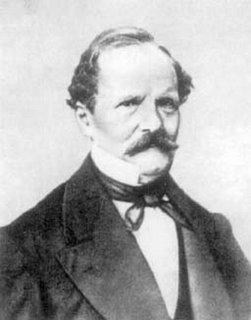 Ernst Eduard Kummer was born in January 29, 1810 in Brandenburg, Prussia. His father was a physician who died when Ernst was 3 years old.
Ernst Eduard Kummer was born in January 29, 1810 in Brandenburg, Prussia. His father was a physician who died when Ernst was 3 years old.When he was 18, he entered the University of Halle with the intention of becoming a protestant minister. As part of his degree, he was required to take math classes. Over time, he switched his major from theology to mathematics.
In 1831, he won a prize for a mathematical essay that he had written. In honor of this essay, the university awarded him a doctorate in addition to his teaching certificate. That same year, he was teaching mathematics at the Gymnasium.
In 1832, he received a more permanent position at the Gymnasium in Leignitz. There he stayed for 10 years. While there, he taught mathematics and physics. One of his students at this time Leopold Kronecker became a very famous mathematician himself. During this time, Krummer also worked hard on mathematical research and wrote an important paper on hypergeometric series in 1836. From this paper, he began a correspondence with the mathematicians Carl Jacobi and Johann Dirichlet. In 1839, while he was still a school teacher, he was elected to the Berlin Academy of Science.
Life was picking up for Ernst Kummer. In 1840, he married a cousin of Dirichlet and in 1842, he became a full professor at the University of Breslau. Sadly, his wife died in 1848.
In 1855, Kummer became a professor of mathematics at the University of Berlin. He was also able to arrange for his colleagues Karl Weierstrass and Leopold Kronecker to also get positions at the University of Berlin. From this point, Berlin became one of the leading mathematical centers of all Europe.
Kummer made major contributions to function theory and number theory. In function theory he extended Gauss's work on hypergeometric series. In number theory, he proposed the concept of "ideal" numbers which later led to the theory of rings which is the foundation of modern algebraic number theory. His work on number theory also led to a major breakthrough on Fermat's Last Theorem.
For his work on Fermat's Last Theorem, Kummer won the Grand Prize from the Paris Academy of Sciences in 1857. He was later elected to the Paris Academy of Science and the Royal Society of London in 1863.
Kummer died on May 14, 1893 when he was 83.
References

No comments:
Post a Comment